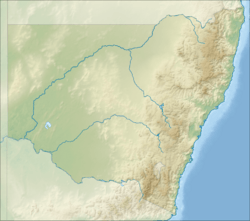Rous River facts for kids
Quick facts for kids Rous River |
|
|---|---|
|
The mouth of the Rous River, located in New South Wales
|
|
| Other name(s) | North Arm Tweed River |
| Country | Australia |
| State | New South Wales |
| Region | NSW North Coast (IBRA), Northern Rivers |
| LGA | Tweed |
| City | Murwillumbah |
| Physical characteristics | |
| Main source | Mount Hobwee, McPherson Range near Numinbah 217 m (712 ft) |
| River mouth | confluence with the Tweed River Tumbulgum 0 m (0 ft) 28°16′26″S 153°27′32″E / 28.27389°S 153.45889°E |
| Length | 44 km (27 mi) |
| Basin features | |
| River system | Tweed River catchment |
| Tributaries |
|
| Nature reserve | Limpinwood Nature Reserve |
The Rous River is a river in New South Wales, Australia. It is part of the Tweed River system. This means its waters eventually flow into the Tweed River. The Rous River flows all year round, making it a perennial river. You can find it in the Northern Rivers region of New South Wales.
Contents
Where the Rous River Flows
The Rous River starts high up on the southern side of the McPherson Range. This is near a place called Numinbah, close to the border between New South Wales and Queensland. The river begins at an elevation of about 217 meters (712 feet).
From its starting point, the river flows mostly towards the east. Along its journey, four smaller streams, called tributaries, join the Rous River. It travels for about 44 kilometers (27 miles). Finally, the Rous River meets the Tweed River at a town called Tumbulgum. This meeting point is northeast of Murwillumbah.
Streams Joining the Rous River
In its higher parts, the Rous River is joined by Hopkins Creek. This creek flows from the southern slopes of the McPherson Range. Further downstream, near the village of Chillingham, Jacksons Creek adds its water to the river.
Closer to where the Rous River meets the Tweed River, two more streams join it. These are Nobbys Creek and Crystal Creek. Both of these creeks come from the Numinbah Nature Reserve. This reserve is south of Springbrook.
Keeping the River Healthy
Sometimes, things can happen that affect the river's health. In 2006, some water that had been treated at the Murwillumbah water plant accidentally flowed into the river. This happened because the plant was damaged and couldn't hold all the water.
Tests showed that the river water was not safe for a short time. Because of this, people were told not to swim in the river for a while.
Plans for the River's Future
In 2007, the government suggested building dams on the Rous River and two other nearby rivers, the Oxley River and Byrrill Creek. Dams are large barriers built across rivers to hold back water.
However, many local people did not want these dams to be built. They formed a group called the Save the Caldera Rivers Campaign. This group worked to stop the dam plans.
 | Delilah Pierce |
 | Gordon Parks |
 | Augusta Savage |
 | Charles Ethan Porter |


